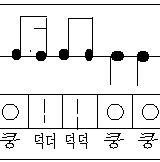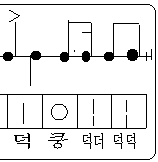Mong-geum-po-taryung (몽금포타령)
click the play button to begin the piece (length 2:36)
Transcription (.pdf)
Commentary
Monggeumpo Taryeong is a folk song originating from the northwestern region of Hwanghae and Pyeongan Provinces, and it is also called Jangsangottaryeong. It is sung in a nasal voice in order to produce a more melancholic and sorrowful sound, illustrating the lives of fishermen and the fishing port, surrounded by hills covered with red rugosa roses. The song describes the beauty of this harbor and the lovers who wait there for sailors to return.
Although the song is from the northwestern region the melodic structure does not follow the typical features of susimgatori, regional distinction and the stylistic tendencies of that region. Instead, the melodic structure of this song is based on ban-gyeongtori, the mid-central sub-style in which the stylistic characteristics are reflected in the unique construction of the pitch collection, presented below. It consists of five pitches, D, F, G, A, C. The D functions as the modal center; F is the third above the central pitch, performed with a downward sliding gesture; the G is performed with downward vibrato and the A is heard with an upward vibrato. All these subtleties of the pitch gestures push down to the A, creating an overall downward melodic direction and shape. The melody of the song begins in the upper register with the pitches moving upward A to C, then gradually moving downward through a melodic sequence made up of the perfect fourths, eventually reaching the central pitch A. These are indicated in the notation with slurs.



 The rhythm is jungmori with four compound beats in a moderate tempo.
The rhythm is jungmori with four compound beats in a moderate tempo.
Overview of Jeongak Music
Within the context of Korean musical tradition, there are two major categories: Jeongak (right [meaning correct] music), music of the court and the aristocracy, and for Minsokak, folk music. Jeongak consists of the music for Confucian rituals, the royal shrine, and banquet and military music. This category also includes a type of ensemble music, pungryu (streams of the wind), popular among the upper class, which flourished in the late Joseon Dynasty in the nineteenth century and was circulated mainly through pungryubang, private clubs for social gatherings of upper-class men. The pungryu includes the lyric song genre gagok and the narrative song genre sijo, as well as the instrumental chamber suite, Yeongsanhoesang. The various repertoires of Jeongak have been preserved and developed mainly through the several Korean systems of notation. One of the most advanced notation systems, Jeongganbo (Korean mensural notation), was created in the reign of King Sejong in the mid fifteenth century and is considered the first mensural notation invented in Asia. It has been widely used in the past and continues to be used today due to the precise indications of both rhythm and pitch that are placed in the square boxes called jeonggan<.
Lyrics
The format of this song consists of a solo and refrain: four measures of verse followed by two measures of refrain. Note that the ending of each refrain is different.
장산곳 마루에 북 소리 나더니 금일도 상봉에 님 만나보겠네
I hear the drum beat from the top of Jan-san-got [Mountain]; I will meet my sweetheart there today
(refrain) 에헤요 에헤요 에헤요 님 만나보겠네
Eh-hey-yo, eh-hey-yo, eh-hey-yo, I will meet my sweetheart
갈길은 멀고요 행선은 더디니 늦바람 불라고 성황님 졸은다
I have a long way to go, the ship is moving slow; I pray again and again to the earth god to conjure winds to move the ship
(refrain) 에헤요 에헤요 에헤요 님 성황님 졸은다
Eh-hey-yo, eh-hey-yo, eh-hey-yo, praying to earth god again and again
님도 보고요 술도 마시며 몽금이 개암포 들렸다 가게나
I will see my sweetheart and drink; I will stop by at the Mong-guem-yi Gae-Am-Po [Harbor]
(refrain) 에헤요 에헤요 에헤요 님 들렸다 가게나
Eh-hey-yo, eh-hey-yo, eh-hey-yo, I will stop by with my sweetheart
바다에 흰돛 쌍쌍이 도으나 외로은 사랑엔 눈물만 겨워라
White sails dot the ocean; the lonely lover’s heart is filled with tears
(refrain) 에헤요 에헤요 에헤요 눈물만 겨워라
Eh-hey-yo, eh-hey-yo, eh-hey-yo, my heart is filled with tears
바람세 좋다고 돛 달지 말고요 몽금이 앞바다 노다나 가지요
The wind is strong, do not raise the sail; my sweetheart, please stay at Mong-geum and have fun with me
(refrain) 에헤요 에헤요 에헤요 노다나 가지요
Eh-hey-yo, eh-hey-yo, eh-hey-yo, I will stop by and have fun